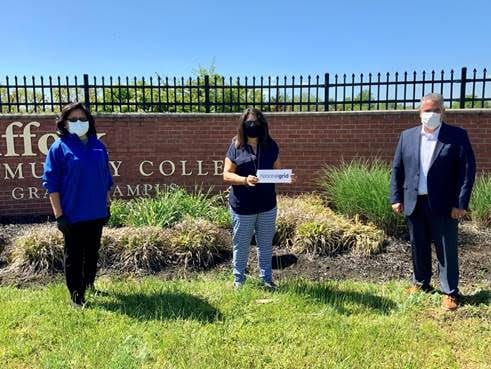The Port Jefferson Generating Station on the shores of Port Jeff Harbor has displayed emission issues at least twice in the past two months, photo evidence and a statement from Long Island Power Authority have shown. While plant operators said they were minor incidents, local environmentalists were much more uncertain.
On Aug. 1, past president and current member of the Cornell Cooperative Extension of Suffolk County, Tim Hopkins, was out on the water in PJ Harbor when he took a picture of one of the chimneys belching black smoke into the air.
Hopkins, who as a Village of Old Field trustee from 2016-18 chaired its environmental committee, said he goes out on the waters of Port Jeff Harbor on average six times a year, and this was the first time he saw the stack make that sort of cloud. He watched the stack exude the black smoke and snapped the picture at 7:40 p.m. The smoke, he said, continued to pour from the stack for some time before he left to go to Flax Pond. When he returned to the harbor, he saw the cloud had drifted over into Long Island Sound, where it lingered for some time.
John Turner, a local environmentalist who previously worked as Brookhaven Town’s director of the Division of Environmental Protection, said during a phone interview that, living on Long Island for 65 years, he could not recall seeing Port Jeff’s or any other power plant expelling emissions “that looked that disturbing, that’s potentially problematic from a health perspective.”
He said he also strongly suspects the black smoke could contain particulate matter, or dust and particles other than the normal gaseous emissions, that could be potentially damaging to breathe.
“That can’t possibly be just carbon dioxide or nitrogen oxide or other gases — that has to be particulate matter, which could be very troublesome to people’s lungs,” Turner said.
State Assemblyman Steve Englebright (D-Setauket) is also the Assembly environmental committee chair. When first he saw an image of the plant’s emissions, he said, “It looks deadly,” adding, “This is not a good day to breathe.”
What it looked like to the assemblyman, a geologist and ardent environmental advocate, was black particulate mixed with the emission plume. Englebright said the emissions were as bad as he’s ever seen in the three decades he’s been in office, and it far exceeds normal opacity standards. Normally when the plant is active there may be a white plume coming from the stack, especially visible in winter when much of the visibility is the hot vapor interacting with cold air to create condensation.
The plant is operated by United Kingdom-based utility company National Grid, and LIPA said in a statement National Grid is aware of all environmental regulatory requirements and the plant normally operates in compliance.
In an email response to inquiries, a spokesperson for National Grid said that the Aug. 1 incident was caused when Long Island’s electric system began to vary load and the unit became unbalanced. The black particles, National Grid said, were “most likely unburnt carbon due to the boiler imbalance,” adding it is similar to what can happen to a home heating system.
The statement said the situation lasted for six minutes while the operator made adjustments to correct the situation. Hopkins reaffirmed he saw the stack smoking for much longer than that.
In response to the assemblyman’s inquiries, LIPA sent an answer instead about another emissions failure which occurred on a separate date, July 11.
LIPA said for 12 minutes, the plant exceeded U.S. Environmental Protection Agency opacity limits on that early July date. The electric utility said the incident was a result of the plant “combusting a mix of natural gas and residual oil,” while increasing load to meet demands on the grid. While increasing load, LIPA said the boiler “experienced an upset, resulting in a temporary interruption of the fuel supply and subsequent loss of load. This caused the unit to smoke (opacity) for a short period.”
LIPA said the emissions on that date were made of various gases such as nitrogen and nitrogen dioxide, but the power authority claimed they were below regulatory limits. It also claimed the plant is unable to measure the amount of carbon dioxide and sulfur dioxide released by the emissions.
National Grid’s statement said the plant’s automated monitoring system notified the control room about the issues. Opacity incidents are reported to the New York State Department of Environmental Conservation 60 days following the end of each quarter. The company added that while opacity exceedance does occur, it maintains compliance a vast majority of the time.
“The plant is well maintained and operates in compliance with environmental regulations greater than 99% of the time,” National Grid’s statement read. “National Grid operators are highly skilled, receive ongoing training and operate the units to maintain compliance with all regulatory requirements. … However, there is no fail-safe item that will guarantee no events in the future.”
In a statement, the DEC said National Grid has reported about the Aug. 1 boiler issue but has no record of a July 11 event. The agency said plant emissions are run through filters to remove particulates before they are released into the atmosphere.
“DEC reviews the data logs from these monitors as part of our rigorous oversight of these facilities to ensure protection of public health and the environment from long-term particulate matter releases,” the agency wrote in its release.
The U.S. Environmental Protection Agency said in a statement the New York DEC is the primary regulator of the facility and sets opacity requirements, though all facilities must follow federal guidelines set by the Clean Air Act. The EPA website lists that it last inspected the Port Jeff site June 16, where the plant passed its compliance inspection.
The units entered service in 1958 and 1960, and have since gone from using coal to diesel, and now runs as a hybrid that takes in both natural gas and oil. The plant only operates a small percentage of the year, but use often peaks during the heat of summer, as more people run their air conditioners, and in the winter when more customers are working their heating systems.
Port Jefferson Mayor Margot Garant said in an email she had not been made aware by LIPA about the opacity violations. She said the sight of the black cloud was highly unusual, as the only time emissions are normally visible at all is during the winter.
Garant and other village officials have been working with an engineering firm in drafting a report to argue for retrofitting the power plant with newer technologies, including a hybrid battery to store energy in case of demand.
“You have old iron here, and when you need help to offset the peak demands, a cleaner plant would be an improvement at the site,” the mayor said.












